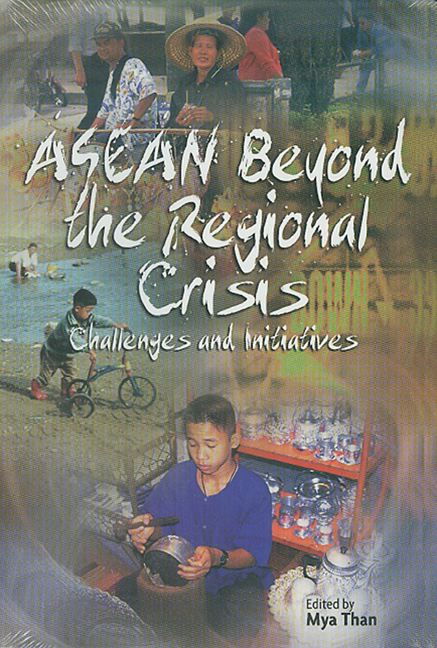Book contents
- Frontmatter
- Contents
- List of Tables
- List of Figures
- Glossary
- Contributors
- 1 ASEAN Beyond the Crisis: A Bird's-eye View
- 2 East Asia: Crisis and Recovery
- 3 Competitiveness and Sustainable Growth in ASEAN
- 4 ASEAN Free Trade Area: Progress and Challenges
- 5 ASEAN Investment Area: Progress and Challenges
- 6 Financial and Macroeconomic Co-operation in ASEAN: Issues and Policy Initiatives
- 7 Food Security in ASEAN
- 8 ASEAN Co-operation and the Environment
- 9 ASEAN and the International Trading System: Regional Trade Arrangement vs. the WTO
- 10 ASEAN and Its Inter-Regional Economic Links
- Appendix I ASEAN's Relevance: Has It Become Questionable?
- Appendix II Is ASEAN Still Relevant? Some Thoughts from a European Perspective
- Index
8 - ASEAN Co-operation and the Environment
Published online by Cambridge University Press: 03 November 2017
- Frontmatter
- Contents
- List of Tables
- List of Figures
- Glossary
- Contributors
- 1 ASEAN Beyond the Crisis: A Bird's-eye View
- 2 East Asia: Crisis and Recovery
- 3 Competitiveness and Sustainable Growth in ASEAN
- 4 ASEAN Free Trade Area: Progress and Challenges
- 5 ASEAN Investment Area: Progress and Challenges
- 6 Financial and Macroeconomic Co-operation in ASEAN: Issues and Policy Initiatives
- 7 Food Security in ASEAN
- 8 ASEAN Co-operation and the Environment
- 9 ASEAN and the International Trading System: Regional Trade Arrangement vs. the WTO
- 10 ASEAN and Its Inter-Regional Economic Links
- Appendix I ASEAN's Relevance: Has It Become Questionable?
- Appendix II Is ASEAN Still Relevant? Some Thoughts from a European Perspective
- Index
Summary
The Dubious Importance of Institutions and Regionalism
Much writing on environmental issues tends to be confined to the environment as an exclusive subject. We may hear about endangered species, the loss of rainforests and wetlands, global climate change as well as the problems of cities, such as overpopulation, and dwindling fish stocks. Less often do we hear about the institutions and processes (or regimes) that are supposed to address these environmental issues. Yet, institutions and processes — at the local, national, regional, and international levels — are fundamental to the making and implementation of environmental policies and laws. Without them, the hopes of environmentalists remain merely hopes. They may not even come to be penned in a formal document, let alone be implemented and complied with.
When there is consideration of institutions and processes in the field of the environment, there is usually condemnation. Writers stress the weaknesses of international regimes in providing environmental governance and protection. In this, there is sometimes an assumption that environmental institutions and regimes are weaker than their counterparts in other areas of concern, such as in trade and in security. There seems, in this regard, to be an aspiration for the holy grail of world government or a binding and authoritative global regime, comparable to the World Trade Organization (WTO). Only a minority of more recent work have suggested the significant role that environmental institutions, without equalling the WTO or approximating world government, can and do play.
There is also, in a number of writings, an assumption in favour of regional frameworks for the environment. Some academics have suggested that the region is the optimal level for environmental rulemaking and compliance. They argue that this is because most environmental problems are too large for a single state to solve, while international environmental agreements are often watered down to the lowest common denominator.2 In comparison, they believe that the region provides sufficient physical space to match the ecological boundaries to the political boundaries. They also suggest that regionalism allows for neigbouring countries to reach agreement more readily on good environmental standards, as they are more immediately affected by a failure to meet such standards.
- Type
- Chapter
- Information
- ASEAN Beyond the Regional CrisisChallenges and Initiatives, pp. 176 - 202Publisher: ISEAS–Yusof Ishak InstitutePrint publication year: 2001



